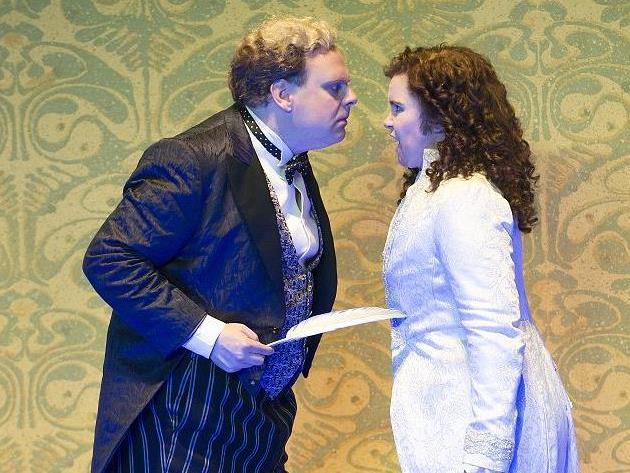Tara Erraught (right) in Strauss’s Der Rosenkavalier. Photo by Tristram Kenton.
Opera critics in The Times, The Daily Telegraph, The Independent and The Financial Times have come under fire for making derogatory remarks about Irish mezzo soprano Tara Erraught’s weight.
Erraught, the Bayerische Staatsoper’s (Bavarian State Opera) principal soloist, made her UK stage debut at the Glyndebourne Festival on Saturday, in the role of Octavian in Strauss’ comic opera Der Rosenkavalier.
Her reportedly excellent performance was overshadowed by sexist and snide remarks about her weight, with The Times’ Richard Morrison calling her ‘unbelievable, unsightly and unappealing’ while Andrew Clark in The Financial Times remarked: ‘Tara Erraught’s Octavian is a chubby bundle of puppy-fat’. Notably, all critics responsible for such remarks were male.
Prominent members of the opera community have rallied to Erraught’s defence.
Writing in The Guardian, fellow mezzo soprano Jennifer Johnstone said, ‘Barely any mention of her voice, a gloriously rounded and well produced instrument, was made, and there was little comment on her musicianship, dramatic commitment or her ability to communicate to an audience and to move that audience to tears…I, for one, had thought we as a country had moved beyond the point where women were treated as second-class citizens, but clearly overt sexism is still rife, no matter what we are led to believe.’
Celebrated British mezzo-soprano Alice Coote, in an open letter to opera critics, commented on the dangers of fat-shaming and focusing on performers’ physical appearance: ‘Singers and teachers know that being underweight is far more damaging to a singer’s wellbeing and performance than being overweight. Similarly, I can tell you that if our stomachs are toned anywhere near a six-pack our sound will suffer. The relaxation needed for low breathing is not aided in any sense by an over worked out body. I know from my own journey that I began to sing with far more physical authority when I got beyond a certain physical weight. Below that I just wasn’t a strong enough vehicle to launch sound from freely into large theatres and concert halls.’
The former North American editor of Gramophone, Anastasia Tsioulcas, remarked icily, ‘The fact that we are having this conversation in 2014 — coming nearly on the back of several staccato outbursts against female conductors — honestly makes me wonder if classical music doesn’t deserve its stereotype of being silly, reactionary, outdated and out of step with the contemporary world.’
Erraught, from Dundalk, Ireland, graduated from the Royal Irish Academy of Music in Dublin and has been a member of the opera studio at the Bavarian State Opera in Munich since 2008. She has not commented publicly on the furore to date.





